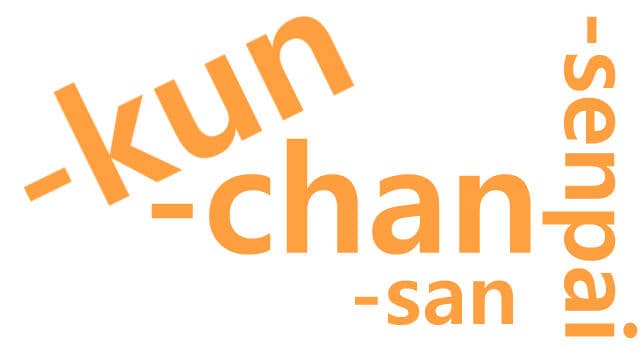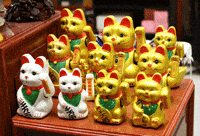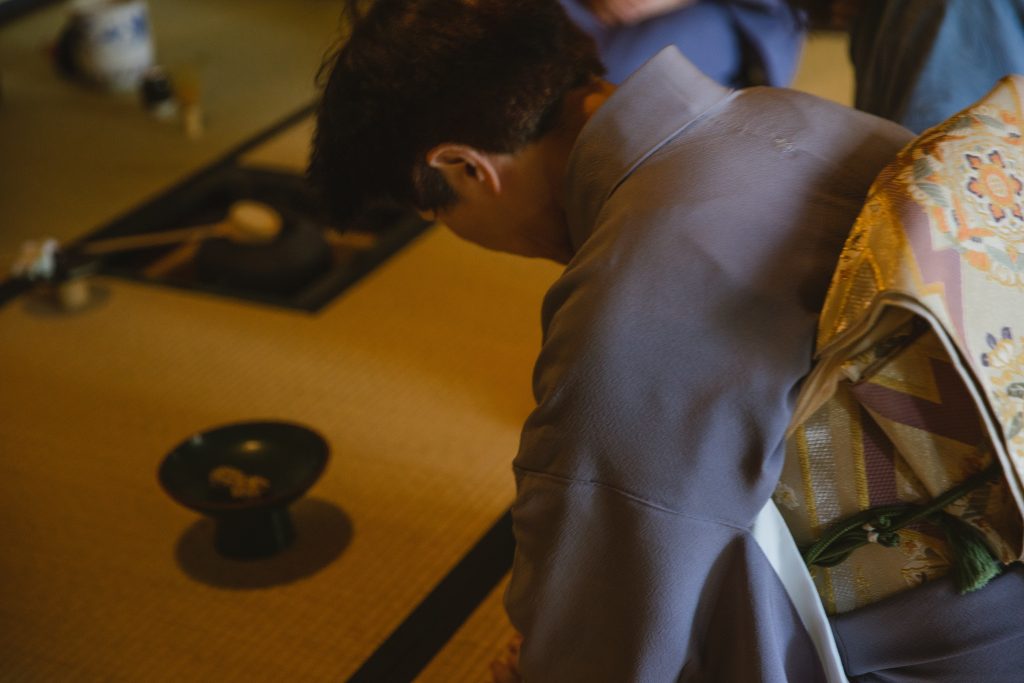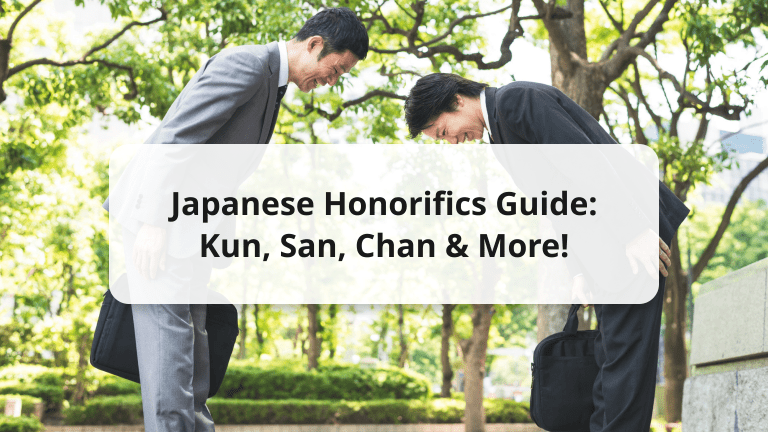Japanese are known for being polite as they use a lot of Japanese honorifics when addressing each other. “San” and “Chan” are common Japanese honorifics, but what does Kun mean in Japanese? And, how many more Japanese honorifics are there? Honorific titles are a very important part of many cultures around the world, especially in Japanese culture. For example, Chad Smith would be addressed as Smith-san in Japan. There are several honorifics used in the Japanese language such as -san, -chan, and Kun, among others.
So, if you are planning to use your hard-earned TEFL certificate to teach English in Japan, just take a vacation in Japan, better understand the dialogue of your favorite anime, or maybe you just want to learn Japanese then this is the place for you! Before we dive into the slightly complicated world of honorifics in Japanese, make sure to get yourself a local Japanese name to carry on!

Basic Japanese Honorifics
Kun (君/くん) – Addressing Young Men
Kun (君/くん) is generally used by people of senior status addressing or referring to those of junior status, or it can be used when referring to men in general, male children or male teenagers, or close male friends. Kun is less polite than san. A male might address female inferiors by Kun, usually in schools or companies which are environments where the cuteness implied by chan is inappropriate but the distance created by san is not quite right either. It can be attached to both surnames and given names. Additionally, Kun is not used between women or when addressing one’s superiors. Kun basically always indicates Mr.
Chan (ちゃん) – Addressing Children and Girls
Chan (ちゃん) is the childish version of san and refers to children and girls. The change from the “s” sound to “ch” is considered cute in Japanese. Chan could also be used to refer to an endearing adult. It is considered arrogant to refer to yourself in the third person in Japanese but chan is the exception. In a casual context, some people, in particular, women, will refer to themselves in a childish third person. Chan can also be attached to kinship terms in the childish language.
FUN FACT! Chan is also frequently used to refer to cute animals and in particular, cats!

San (さん) – Equivalent to “Mr.” or “Mrs.”
San (さん), is the most common honorific, equivalent to “Mr.” or “Mrs.” It is a title of respect, so it is okay to use for anyone, especially if you are not sure which honorific to use. It can be used with both male and female names, and with either a surname or a first name. It can also be attached to the name of occupations and titles. For example, ‘bookstore (本屋) + san (さん) = “bookseller” (本屋さん).’
Sama (さま) – Respectful version of “San”
Sama (さま) is the respectful version of san, mostly used in business and clientele contexts, for people of higher rank, or somebody you admire. This is because the implied superiority of the guest or customer is very strong. Sama is gender-neutral just like san.
| Romaji | Japanese | English | Usage |
| Kun | 君/くん | Younger man | Refer to those of junior status |
| Chan | ちゃん | Children or girls | It can be used to call cute animals, like cats |
| San/Sama | さん/さま | Mr. or Mrs. | Sama is the respectful version of “San” |
Japanese Honorifics for Occupations and Schools
Those were the basic Japanese honorific titles. We will now look at occupational honorific titles. Beware of the Japanese working environment! In traditional Japanese companies and workplaces, instead of honorific titles, Japanese workers can be addressed by their work titles.
Buchou (部長) – Addressing your Boss
When talking to your boss, you’ll call him buchou (部長). This means “manager,” and you can use it with their last name or without. For example, you can say “Tanaka-buchou” or just “Buchou.” Both are respectful. For example:
Kachou (課長) – Addressing your Section Managers
Kachou (課長) is more specialized than buchou. Buchou means general manager while kachou means section manager. The slight difference between the two is not so slight in Japanese workplaces. Be sure to know when to use the correct honorific or you could get fired!
Kaichou (会長) – Addressing the Company Chairman
Kaichou (会長) is higher ranked than the previous two in a Japanese company. Kaichou is used when referring to the chairman of the company.
Shachou (社長) – Addressing the CEO
Shachou (社長) is the title of the highest-ranking person in a Japanese company. It is the Japanese equivalent of the CEO or company president.

Senpai (せんぱい) – Addressing a Senior
Senpai (せんぱい), is the equivalent of “senior.” This is used for classmates in higher grades and all people with more experience than yourself either at work, club, or in any kind of group.

Kohai (こうはい) – Addressing a Junior
Kōhai (こうはい), is the equivalent of “junior” and the opposite of senpai. As it can appear condescending, it is not used as a suffix.
Sensei (せんせい) – Addressing an Authority Figure
Sensei (先生、せんせい) is used to refer to an authority figure in any field. You are unlikely to make any mistakes with sensei, which can be used to address a teacher, doctor, martial arts master, or recognized artist of either gender. It can be used after a surname or on its own.
Hakase (はかせ) – Addressing a Doctor or Professor
If a person has high academic expertise, you would refer to them as hakase (博士、はかせ). This is the equivalent of a doctor or professor. This title should be used with the last name or by itself to replace the name.
| Romaji | Japanese | English |
| Buchou | 部長 | Boss |
| Kachou | 課長 | Section Managers |
| Kaichou | 会長 | company chairman |
| Shachou | 社長 | CEO |
| Senpai | せんぱい | Senior |
| Kohai | こうはい | Junior |
| Sensai | せんせい | Authority figure |
| Hakase | はかせ | Doctor or Professor |

Dos and Don’ts When Using Japanese Honorifics
Honorifics have played an essential sociolinguistic role in Asian languages, such as Japanese, for hundreds of years. Asian societies have a strict social hierarchy in place and this social hierarchy is reflected in the language, especially the use of honorifics. Since Japanese society values hierarchy, someone of higher status may drop the honorific title when addressing someone of a lower status. Here are some dos and dont’s when addressing people in Japanese with honorifics:
- Don’t use honorifics when you’re talking about yourself. It would make you sound cocky and arrogant.
- Family members will be referred to different honorifics
- It is up to you and the person you speak with to decide whether to use honorifics or not
- it is still important to follow Japanese honorifics even if you’re not from Japan
Remember, the use of honorifics must never be downplayed. It is an integral part of the language. Japan uses honorifics to show how much they value respect. They also use these words to determine everyone’s particular place in society, which, again, is a part of their culture.
Japanese Honorifics are Just Tips of the Iceberg
These honorifics are just a glimpse of Japanese culture. We cannot stress enough how important respect is for Japanese people and in Japanese culture. They even have respectful ways of greetings, like saying good morning in Japanese, goodbye in Japanese, and even eating sushi. Those are not the only things unique to their culture, too, so feel free to explore other cultural nuances, as well. There are many ways to improve your Japanese, such as by using different apps to learn Japanese, or learning with native tutors at AmazingTalker!
Discover the answers to your language-related questions on AmazingTalker’s Q&A page.

















